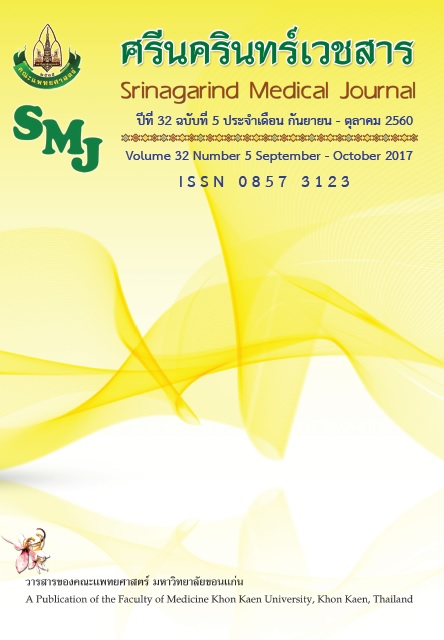Effects of Glyphosate 48 on Human Red Blood Cell Indicies, Osmotic Fracgility and Oxidative Stress Production in Vitro
Abstract
Background and objectives: Several studies indicated that glyphosate, such as Roundup, could induce red blood cell lysis and produce free radicals. The researchers aimed to evaluate direct effects of another commercial glyphosate 48 on damage and oxidative stress production of red blood cell (RBC) via lipid peroxidation in vitro.
Methods: Normal RBC s from 10 volunteers were incubated with glyphosate 48 %w/v at final concentrations of 0.1, 0.2 and 0.4 %v/v at 37°C for 3 hour, which was the condition did not cause cell lysis. Then the cells were measured hemoglobin (Hb), hematocrit (Hct), mean corpuscular volume (MCV), mean corpuscular hemoglobin (MCH) and mean corpuscular hemoglobin concertration (MCHC), cell lysis in various concentrations of hypotonic saline solution (osmotic fragility test) and MDA level, product of lipid peroxidation, compared to RBC in 0.85% NSS (vehicle control).
Results: Glyphosate 48 at the concentration of 0.2 %v/v could increase volume (MCV) and decrease hemoglobin concentration (MCHC). Moreover, all concentrations of glyphosate also increased RBC fragility significantly , but raised MDA in low level, compared to control.
Conclusions: Glyphosate 48 in this study had effect on destroying hemoglobin and cell membrane of RBC.Moreover, it induced oxidative stress production through lipid peroxidation which is the one factor that promote increasing of RBC membrane fragility.
ฤทธิ์ของสารไกลโฟเสท48 ต่อค่าดัชนีเม็ดเลือดแดง ความเปราะ และการเกิดภาวะเครียดออกซิเดชั่นของเม็ดเลือดแดงมนุษย์ในหลอดทดลอง
ฟ้า เชื้อหงษ์ทอง*, กันยารัตน์ หนูเอียด, จรินทร จอมจันทร์
สาขาเทคนิคการแพทย์ คณะสหเวชศาสตร์ มหาวิทยาลัยพะเยา อ.เมือง จ.พะเยา 56000
หลักการและวัตถุประสงค์: หลายการศึกษาบ่งชี้ว่าไกลโฟเสท (Glyphosate) เช่น ราวน์อัพ (RoundupÒ) สามารถทำให้เม็ดเลือดแดงแตกและสร้างอนุมูลอิสระ การศึกษานี้จึงมีวัตถุประสงค์เพื่อประเมินฤทธิ์ของไกลโฟเสท48 อื่นต่อความเสียหายและการเกิดภาวะเครียดออกซิเดชั่น (oxidative stress) ผ่านการออกซิเดชั่นของไขมัน (lipid peroxidation) ของเม็ดเลือดแดงมนุษย์ในหลอดทดลอง
วิธีการศึกษา: นำเม็ดเลือดแดงปกติจากอาสาสมัคร10 รายไปบ่มกับไกลโฟเสท 48 %w/v ความเข้มข้นสุดท้าย 0.1, 0.2 และ 0.4 %v/v ที่ 37°C,3 ชั่วโมง จากนั้นวัดค่าฮีโมโกลบิน(Hb), ฮีมาโตคริต (Hct), ปริมาตร (MCV), น้ำหนัก (MCH) และความเข้มข้น (MCHC) ฮีโมโกลบินเฉลี่ยต่อหนึ่งเม็ดเลือดแดง การแตกของเม็ดเลือดแดงในน้ำเกลือที่ความเข้มข้นต่างๆ (osmotic fragility test) และระดับ Malondialdehyde (MDA) ผลิตภัณฑ์จากการเกิดออกซิเดชั่นของไขมันเทียบกับเม็ดเลือดแดงในน้ำเกลือเข้มข้น 0.85% (กลุ่มควบคุม)
ผลการศึกษา: ไกลโฟเสท48 ที่ความเข้มข้น 0.2 %v/v ทำให้เม็ดเลือดแดงมีปริมาตร (MCV) เพิ่มขึ้น และลดความเข้มข้นของฮีโมโกลบินต่อหนึ่งเม็ดเลือดแดง (MCHC) นอกจากนี้ไกลโฟเสททุกความเข้มข้นยังทำให้ความเปราะของเม็ดเลือดแดงเพิ่มขึ้นอย่างมีนัยสำคัญทางสถิติแต่ทำให้ระดับ MDA เพิ่มขึ้นในระดับต่ำเมื่อเทียบกับกลุ่มควบคุม
สรุป: ไกลโฟเสท 48 ในการทดสอบนี้มีฤทธิ์ในการทำลายฮีโมโกลบินและเยื่อหุ้มเซลล์ของเม็ดเลือดแดง รวมทั้งเหนี่ยวนำให้เกิดภาวะเครียดออกซิเดชั่นผ่านการทำลายโครงสร้างไขมัน ซึ่งเป็นปัจจัยหนึ่งที่ส่งเสริมให้เยื่อหุ้มเซลล์มีความเปราะเพิ่มขึ้น




